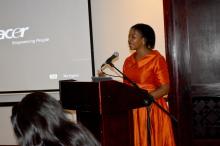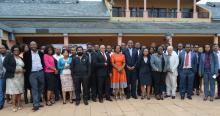The quality of service and quality of experience training organized for communications regulators in the Southern African Development Corporation (SADC) commenced on the 8th May 2017. The training has attracted 105 participants from 8 SADC countries as well as participants from France, Spain and the United Kingdom.

The training was officially opened by Ms Cecilia Mmamelodi-Onyandile representing the SADC Secretariat. In her remarks, Ms Mmamelodi-Onyandile stated that the training workshop which is aimed at enhancing capacity in QoS and QoE comes at a time when the region is challenged with regulatory issues related to QoS and QoE. She indicated that regulation of QoS and QoE is becoming more complex due to technology advancements and dynamic industry innovation. She emphasized the need for continuous sensitization in the region and appreciated the work that CRASA and ITU have done to build capacity in a series of thematic areas.
A representative of the Botswana Communications Regulatory Authority (BOCRA), Mr Thapelo Mogopa, welcomed participants to the training. He highlighted the importance of QoS including costs of services. He indicated that he hoped the workshop will address challenges faced by regulators in implementation of QoS and QoE. Ms Anne Rita Ssemboga, representing the ITU Regional Office for Africa, noted that with the advent of new technologies there are a number of players in the region whose services are interrelated and as a result QoS is growing in importance at global and regional level. She informed the participants that ITU is working on activities that will assist its stakeholders with QoS and QoE such as the development of the global quality of service manual, the WATRA guideline on QoE and QoE and the Quality of Service training programme.

The training, which will last three days, will cover an overview of QoS and QoE. The training programme is designed based on the Quality of Service training programme (QoSTP) developed by ITU. Countries represented are expected to share case studies based on their QoS and QoE practice and experiences. These case studies will complement regional reference materials for the QoSTP, and feed into the QoS manual that ITU is currently developing.